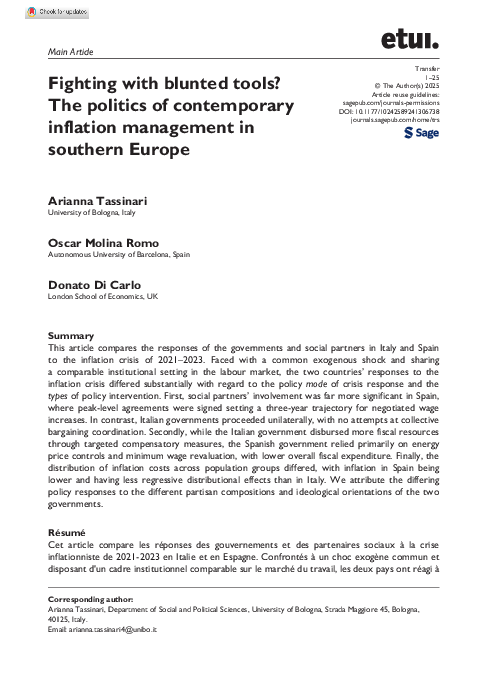Fighting with blunted tools? The politics of contemporary inflation management in southern Europe

Tassinari, Arianna ; Molina Romo, Oscar ; Di Carlo, Donato
Transfer. European Review of Labour and Research
2024
Early view
1-25
inflation ; economic recession ; social dialogue ; trade union ; collective bargaining ; wages
Wages and wage payment systems
https://doi.org/10.1177/10242589241306738
English
Bibliogr.
"This article compares the responses of the governments and social partners in Italy and Spain to the inflation crisis of 2021–2023. Faced with a common exogenous shock and sharing a comparable institutional setting in the labour market, the two countries' responses to the inflation crisis differed substantially with regard to the policy mode of crisis response and the types of policy intervention. First, social partners' involvement was far more significant in Spain, where peak-level agreements were signed setting a three-year trajectory for negotiated wage increases. In contrast, Italian governments proceeded unilaterally, with no attempts at collective bargaining coordination. Secondly, while the Italian government disbursed more fiscal resources through targeted compensatory measures, the Spanish government relied primarily on energy price controls and minimum wage revaluation, with lower overall fiscal expenditure. Finally, the distribution of inflation costs across population groups differed, with inflation in Spain being lower and having less regressive distributional effects than in Italy. We attribute the differing policy responses to the different partisan compositions and ideological orientations of the two governments."
Digital
The ETUI is co-funded by the European Union. Views and opinions expressed are however those of the author(s) only and do not necessarily reflect those of the European Union or the ETUI.